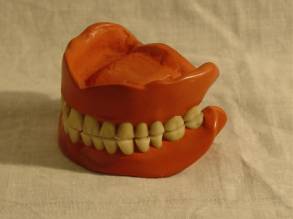|
|
Seniors Like Dentures But Don't Change Eating Habits
The Senior Journal
August 22, 2005

A small study in Ireland has found that senior citizens equipped with new dentures did not change their food choices back to what they had been before becoming toothless. They did report, however, that they liked their dentures.
"Food selection among the group studied was not ideal, and not improved by the provision of new dentures," according to the study.
The subjects were rated as medium risk for poor nutritional status on the Mini Nutritional Assessment (MNA) score.
Three quarters of the sample felt they had no nutritional problems. However, approximately 70% reported that they had changed their food choices because of their loss of teeth and that financial cost was a barrier to dental treatment.
This prospective clinical study was carried out at Cork University Dental Hospital in Ireland by P.F. Allen. The participants were 35 toothless adults who requested new complete dentures. The study is published in the September 2005 issue of the Journal of Oral Rehabilitation.
Only about 30 percent of U.S. senior citizens 65 and older no longer have any natural teeth. Interestingly, toothlessness varies greatly by state. Roughly 42 percent of older Americans living in Kentucky and West Virginia are toothless, compared to only 13 percent of those living in Hawaii. The problem has also been decreasing with advances in medical care and nutrition. Twenty years ago about 46 percent of U.S. seniors lacked teeth. All the figures, however, are much higher for people living in poverty.
Having missing teeth can affect nutrition, since people without teeth often prefer soft, easily chewable foods. Because dentures are not as efficient in chewing performance as natural teeth, denture wearers also may choose soft diets and avoid fresh fruits and vegetables.
Periodontal (gum) disease or dental decay (cavities) most often cause tooth loss. Older Americans continue to experience dental decay on the crowns of teeth (coronal caries) and on tooth roots (because of gum recession).
Severity of periodontal (gum) disease increases with age. About 23 percent of 65- to 74-year-olds have severe disease, which is measured by 6mm loss of attachment of the tooth to the adjacent gum tissue. At all ages men are more likely than women to have more severe disease. At all ages, people at the lowest socioeconomic level have the most severe periodontal disease.
Drink fluoridated water and use fluoride toothpaste; fluoride provides protection against dental decay at all ages.
Practice good oral hygiene. Careful tooth brushing and flossing to reduce dental plaque can help prevent periodontal disease.
Get professional oral health care, even if you have no natural teeth. Professional care helps to maintain the overall health of the teeth and mouth, and provides for early detection of pre-cancerous or cancerous lesions.
Avoid tobacco. In addition to the general health risks posed by tobacco use, smokers have seven times the risk of developing periodontal disease compared to non-smokers. Tobacco used in any form - cigarettes, cigars, pipes, and smokeless (spit) tobacco - increases the risk for periodontal disease, oral and throat cancers, and oral fungal infection (candidiasis). Spit tobacco containing sugar also increases the risk of dental decay.
Limit alcohol. Excessive alcohol consumption is a risk factor for oral and throat cancers. Alcohol and tobacco used together are the primary risk factors for these cancers.
Make sure that you or your loved one gets dental care prior to undergoing cancer chemotherapy or radiation to the head or neck. These therapies can damage or destroy oral tissues and can result in severe mucosal inflammation and ulcers, loss of salivary function, rampant decay, and destruction of bone.
Caregivers should attend to the daily oral hygiene procedures of elders who are unable to perform these activities independently.
Sudden changes in taste and smell should not be considered signs of aging but should be an alert to seek professional care.
Some of the information in this article is from the National Center for Chronic Disease Prevention and Health Promotion - Oral Health for Older Americans.
|
|



